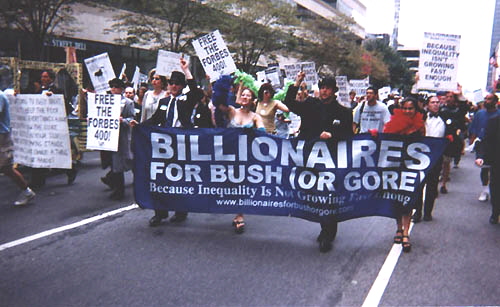JOURNAL OF THE FELLOWSHIP OF QUAKERS IN THE ARTS
Issue #19, Fall 2000
Keeping a Culture of Hope Alive
 by Steve
Gulick
by Steve
Gulick
Steve Gulick is a member of Central Philadelphia Monthly Meeting. He is an actor and social
activeist with long experience of street theater. As the Peace Meal Player, he impersonates John
Woolman and other Quaker figures and provdes a Friendly presence at battle reenactments in the
area. There is a great deal to protest, to struggle against, and to work to change. And, while there can be considerable disagreement among Friends and progressive people more generally as to how best to struggle and protest and even which issues should be dealt with first, we do agree that, whatever else we are able to do, we need to challenge injustice and oppression. Friends often call this "speaking truth to power."
This can, however, take its toll. Our disagreements sometimes appear to put more distance between ourselves than between us and the institutions of wealth and power. Differences with our comrades can make us feel beleaguered and alone. Being told, as we often are by those more connected to the status quo, "Why don't you stand FOR something rather than AGAINST?" or "Just be patient, the system will reform itself," or "Can't you see that your protest only makes matters worse?" begins to wear on us. So in part, activists burn out and drop out because it is hard work we are engaged in. It is ongoing work.
But in part we burn out to the extent that we ourselves are tied to the dominant, oppressive culture. This is why developing our own culture of hope is so important. Ironically, it is also why authorities are so threatened by art that questions or is used to question the status quo.
For example, the police recently raided and destroyed a puppet-making atelier in West Philadelphia during the Republican National Convention. I had occasion to listen to the distress of one of the artists in charge of the puppet making. He was in tears about the official destruction of his art— police destroyed all the puppets, materials, and tools (including his personal ones) in a trash compacter. (Why, he wondered, was this destruction permitted when temporary modification of the statue of Frank Rizzo outside of the Municipal Services Building was a crime?)
He was especially distressed that his puppets had been wasted—destroyed before they could fulfill the purpose for which they had been created. As he talked, this perception began to change, and he suggested that perhaps the puppets had been martyred. This seemed to give him a sense of hope and a sense that there had been purpose in his creative efforts. That the puppets had fulfilled a dramatic role nonetheless.
We need clearly to develop our own culture of survival and hope—culture not dependent on big money interests or on powerful political connections. What is sometimes called street theater or political theater plays an important role in this alternative culture. In the 1970's Maxine Klein of Little Flags Theater in Boston wrote a book called Theater for the 98&037;. The basic thesis of the book was that only 2&037; of the population goes to the theater and that the plays produced there tend to support the status quo, either because of their content or because most theater companies are dependent on the largess of big companies and wealthy individuals to survive and therefore are artistically compromised. Klein sought to develop a theater that could go where the rest of the people were—into the streets, into the parks, into community centers, into the hearts and minds of the 98&037;!
Street theater is about protest and celebration, about action and satire, about fun and games. Because it is entertainment, it tends to be accessible in a way that street speaking may not be. When people are faced with live entertainment, they tend to sit back and relax and enjoy the show! In this relaxed state they are much more receptive to different perspectives than they would be at a speech by, say, Steve Gulick on peace, freedom, and social justice!
Moreover, street theater, unlike vigils and marches, is about acting. It is about being active in a world that increasingly encourages us to be voyeurs—watching television, watching sports, watching politics—and consumers—consuming just about everything in sight. If we are encouraged to be active if only in small ways in our daily lives, we begin to take back some of the power that is inherently ours; Street theater can he empower us because those doing the acting are often inches away from us and even may include us in their action! While it is acting in an imaginary situation, it is acting and as But the messages, while simplified, are catchy and often encapsulate at least a Little Truth, while engaging us with the Characters in the Situation.
From a technical point of view, lines need to be clearly spoken, not too complex, and probably somewhat repetitious. Costumes and make-up and props should all be fairly quickly understandable and probably overstated, as should the characterizations themselves.
Most of all street theater should be engaging and entertaining, not preachy. Show the audience the issue / concern / cause; don't tell them about it. And, as with any theater piece, we need to know what we are doing, where, and for whom! The goal is not great literary theater—although some street theater is great—nor is it simple agitprop; the goal is to be a part of winning people's hearts and minds about a particular issue.
With an idea and work, you too can take your show on the road!
Types & Shadows is published quarterly by the Fellowship of Quakers in the Arts. Subscriptions are available through membership in the FQA.
Top | T&S Archive | Subject Index | FQA Home Page
Join FQA | Contact usThis page added 2002